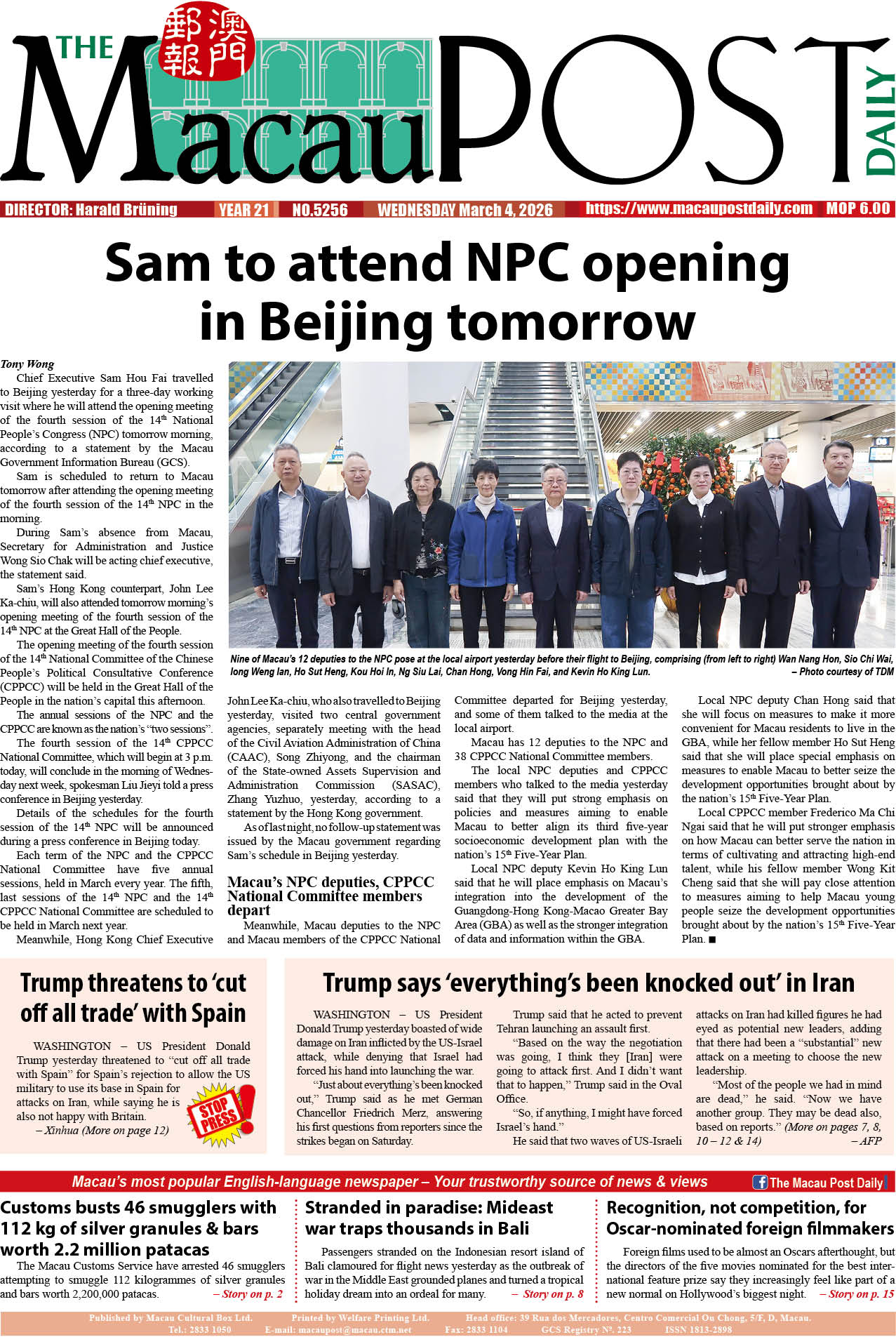Prisca Tang
“One doesn’t need to understand Patuá to enjoy Patuá comedy,” Miguel de Senna Fernandes told The Macau Post Daily at his office in Nam Van last week.
Senna Fernandes said that Patuá comedy uses actors’ body language to express jokes.
“Once, an audience member came up to me and said that he did not understand a word we were saying during the play, but he still found it really funny,” Senna Fernandes said light-heartedly.
In 2009, UNESCO’s Atlas of the World’s Languages in Danger classified Patuá as a “critically endangered” language. According to Wikipedia, Patuá is a Portuguese-based Creole language with a substrate from Cantonese, Malay and Sinhala, which was originally spoken by the Macanese community in Macau. It is now only spoken by a few families in Macau but quite a few among the Macanese diaspora.
Senna Fernandes pointed out that in Macau over 90 percent of the population speaks Chinese, mainly Cantonese but also Putonghua and that only a few locals still speak Patuá.
Senna Fernandes, a lawyer by profession, underlined that even though only a small part of the population are non-Chinese, “in Macau we have been able to maintain a harmonious relationship over hundreds of years.”
Senna Fernandes said that in the past 10 years, he mainly looked for actors who speak Patuá but as the pool is so small now he also finds Chinese and Portuguese actors and teaches them the language.
‘Acting ability’ vs language knowledge
He said the most important thing is not the actors’ language ability but their “acting ability”.
“We don’t necessarily look for professional actors. We find people that can actor. I, myself, am not a professionally trained play director yet my 20-year experience of directing will compensate for the fact that I never attended a drama school,” Senna Fernandes said. He added that Patuá is not an exclusive cultural circle since everyone can learn the language and its culture.
‘Boss for a day’
Senna Fernandes said that his upcoming play, “Boss for a day”, is a comedy about an employee that never says no and is always there when a colleague needs his help, adding that on the day of the employee’s wedding day, he faces a dilemma between his marriage and his job.
Senna Fernandes said that Patuá plays are usually comedies, pointing out that even though the play wants to criticise a certain situation, it will still be in the form of satire. He said that in his play the dialogue is mainly in Patuá with a mixture of Portuguese and Cantonese. He said, “Well, that is how we communicate on a daily basis anyway”.
Message of hope
When asked what the message of the play is, Senna Fernandes said it is “a message of hope.” He said that his latest play’s main character is willing to help with everything, but doesn’t seek monetary compensation.
Senna Fernandes said that after all, like the Chinese often say, “your charity will be rewarded” in one form or another. He underlined that the ultimate message of most of his comedies is that kind-hearted people often have happy endings.
Senna Fernandes said that during a difficult time, like the COVID-19 pandemic, he hopes to send a hopeful message to the audience through the play. He added that “of course, I would also want to spread laughter and the Patuá culture too”.
The play will be performed at the Macau Cultural Centre’s (CCM) Grand Auditorium on Saturday and Sunday at 8 p.m. Tickets are priced between 120 patacas and 250 patacas.

Patuá play director-cum-lawyer Miguel de Senna Fernandes talks to the media on the sidelines of last month’s press conference about the 31st Macau Arts Festival (FAM) at MGM COTAI last month.
Photo: Prisca Tang (All the other photos courtesy of Macau Cultural Affairs Bureau)













